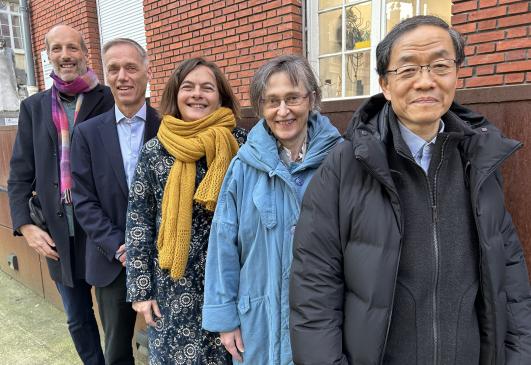
The Abel committee’s difficult choice
The Abel committee has the honorable assignment of annually suggesting names to be regarded as the world’s leading mathematicians and thus worthy recipients of the Abel Prize.
Professor Helge Holden (NTNU) is chair of the committee. He is accompanied by four internationally recognized mathematicians. They are appointed by the board of The Norwegian Academy of Science and Letters, based on nominations from the International Mathematical Union (IMU) and the European Mathematical Society (EMS). Every year two members are replaced, whereas the chair is replaced every four years.
Outstanding reseachers
In this year’s committee, Martin Hairer and Ursula Hamenstädt have taken over from Parimala Raman (Emory University, USA) and Ulrike Tillmann (University of Cambridge, Storbritannia).
Martin Hairer is Professor at EPFL in Lausanne, Switzerland, and Imperial College in London, Great Britain. His main area of interest is probability theory and -analysis, with special focus on stochastic partial differential equations.
Ursula Hamenstädt is Professor at Rheinische Friedrich-Wilhelms-Universität in Bonn, Germany. Her primary research subject is differential geometry, dynamical systems, geometric group theory and Teichmüller theory.
The continuity of the committee work is secured by chair Helge Holden and committee members Alice Guionnet og Jun-Muk Hwang.
Helge Holden is Professor at The Norwegian University of Science and Technology (NTNU) in Trondheim, Norway. His field of research is differential equations and mathematical physics, in particular hyperbolic conservation law and completely integrable systems.
Alice Guionnet is Director of Research at the Centre National de la Recherche Scientifique (CNRS), Ecole Normale Supérieure in Lyon, France. Alice Guionnet is known for her work on probability theory, in particular large random matrices and spin glasses.
Jun-Muk Hwang is Director of Research at the Center for Complex Geometry, Institute for Basic Science in Daejeon, South-Korea. His research is centered on the interaction of algebraic geometry and differential geometry.
The evaluating process
– There is no shortage of good candidates for the prize, committee leader Holden tells us.
The committee’s work is based on expert statements from mathematicians all over the world, and the process of choosing the best candidate(s) is difficult and time consuming.
– The committee is both impressed and grateful to our colleagues for all the thorough presentations we receive. But the committee is left with a difficult task of choosing the best candidate from a broad specter of fields, says Holden.
The Abel committee has four meetings a year. The first meeting takes place in The Norwegian Academy of Science and Letters’ house in Oslo, Norway. This is followed up by two online meetings. Then a final gathering will take place in the home city of one of the members who are due to step out of the committee.
This year they met up in Paris, where Alice Guionnet is affiliated with École Normale Supérieure (ENS). In the course of two days at the stately premises of the French Academy of Sciences, the committee has come to a conclusion on their nomination for the Abel Prize.
This meeting is traditionally followed by the Abel Symposium, which features four lectures open to the public. This year’s Symposium was held at the Henri Poincaré Institute.
The board of The Norwegian Academy of Science and Letters appoints the recipient of the Abel Prize 2024 after receiving the nomination from the committee. The laureate will be announced on March 20th. The prize ceremony takes place in Oslo on the 21st of May.
The Norwegian Academy of Science and Letters is very grateful for the committee’s effort, which is done pro bono.
See the ethical guidelines for the commitee and former Abel committees
Follow the announcement of the Abel Prize 2024 on our YouTube channel
Information about the events of the Abel Week in Oslo 21st-25th of May.